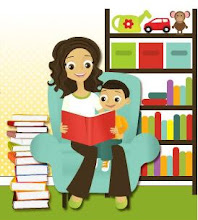How do you celebrate Black History Month with preschool and kindergarten children? Or do you celebrate it at all with this age group? I say… NO. I know, I know….as an African American female, I should be supportive of Black History Month. And really I am - sadly, many people wouldn't even think about Black History if it wasn't for February. But I’d like us to move away from having the need to highlight African Americans once a year. We are creating a new generation of thinkers…a new generation of citizens…what can we do to help everyone move beyond this segmented view of African American history?
If your classroom only reads books about Martin Luther King and Barack Obama in February, then there is a problem. I’m challenging early childhood educators to expose children to people of all races and cultures regardless of what the calendar says. Even if every child in your classroom is the same race, diversity still has a place. The world is diverse all year around, not just in February.
We, as early childhood educators, “get it right” when a lot of others don’t. I think the public school systems can learn a lot from us. Too often, when kids get to “real school” the system paints all kids with one big brush, and if you don’t fit, you either fall through the cracks or end up in a special education program. In early childhood, we know how to tailor our curriculum to fit the needs of individual children. We know that gym and recess aren't "extra-curricular" activities, but that physical activity is necessary for healthy development. We know that we have to attend to the “whole child” and not just his or her test-taking ability. We know that children learn by doing and that authentic assessment has little to do with paper and pencil tests. I think we’ve got it right in a lot of ways. So, since we are the forerunners and foundation-layers in education, we are in a position to set an example for children, families, and other educators. Let’s use Black History Month as a reminder to ourselves that diversity should be a part of everything we do.
I challenge you, not to say "NO" to Black History Month, but to make every month about diversity, acceptance, and inclusiveness. When you are doing your farm unit, learn about George Washington Carver, not because it’s February, but because it’s relevant to your curriculum or theme. Take a new approach to history – look at every unit and theme that you introduce and find a relevant, sensitive, and appropriate way to expose children to diversity so that it becomes a part of everyday conversation, not something separate that we put away at the end of the month. Change starts with us…
This feed has moved and will be deleted soon. Please update your
subscription now.
3 years ago
























Wonderful post--I agree completely.
ReplyDeleteWell said! I agree wholeheartedly!!
ReplyDeleteLove It!
ReplyDeleteTonya,
ReplyDeleteDo you already have a list of books where the main characters are African American? I could use a few new titles to read to my sons.
Marcia - Stop in tomorrow...I created a post just for you :-)
ReplyDeleteWow. Amazing and totally accurate post!!
ReplyDeleteGreat post. I completely agree. Black History month has just ended and my preschooler has been frightened and scared by his teacher's efforts to "educate". The teachers selected the book Henry's Freedom Box for the three and four year old classroom story time. A powerful story it terrified the kids, my son included. Since the story my son is, for the first time ever, acutely aware of "light skinned" and "dark skinned" people. He learned that light skinned people were mean to the dark skinned people and his four year old conclusion, "I am glad I am not dark skinned". I ask you, what kind of lesson is that for a child? How does that promote diversity? Preschoolers are too young to understand the concepts and background of Black History Month lessons. A daily approach to diversity as opposed to a "get it all in in a week" approach is the way to go. Thanks for the post.
ReplyDeleteSo true! It is time for us to incorporate civil rights and African-American history as it pertains to the curriculum we are studying and not just once a month. I believe that it sends the wrong message. We live in a multi-cultural society and our curriculum needs to reflect that more than just in February
ReplyDelete